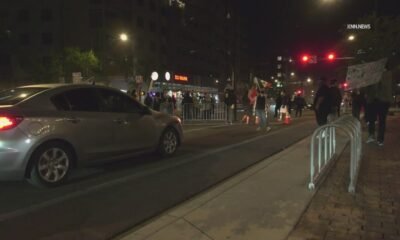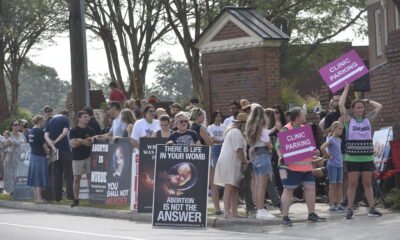crime
Concerns Mount Over Disinformation and Violence as Elections Approach

A pro-democracy organization has raised alarms about potential disinformation and violent rhetoric following the upcoming election, predicting a scenario possibly more chaotic than the previous presidential transition. The Defend Democracy Project shared these concerns just days before the election concludes on November 5, at a time when several races remain too close to call.
Olivia Troye, a former adviser on homeland security, emphasized that misinformation could undermine public trust in the electoral process as mail-in ballots are counted. This mirrors concerns from 2020 when post-election unrest erupted after Donald Trump’s loss.
Troye warned that false claims from candidates, particularly Trump, could incite violence reminiscent of January 6, 2021, should he again fail to secure the Electoral College. She noted alarming reports from the FBI and Homeland Security predicting threats against election officials and even polling places, referencing recent incidents involving ballot drop boxes in Oregon and Washington.
Michael Podhorzer, the project’s chair, explained that a larger margin of victory in 2020 prevented any single election official from overturning the results. However, he cautioned that this election might unfold differently if Kamala Harris were to win narrowly, increasing the potential for disputes over Electoral College votes.
A recent survey from the Associated Press-NORC Center indicates that while 86% of registered voters believe the losing candidate should concede, only 33% anticipate Trump will do so. Conversely, 77% expect Harris to accept the results if she loses, highlighting public anxiety about the prospect of post-election violence.
Concerns extend beyond domestic issues; foreign interference remains a significant worry. The co-chairs of Issue One’s National Council on Election Integrity condemned recent misinformation efforts, including a fabricated video about ballots in Pennsylvania, underscoring the pressing need to maintain confidence in the electoral system.
A separate controversy erupted at a Trump rally in New York regarding offensive comments made by comedian Tony Hinchcliffe about Puerto Rico. Both Democrats and Republicans condemned his remarks, claiming they perpetuate harmful stereotypes and encourage discord.
Congressional Hispanic Caucus Chair Nanette Diaz Barragán characterized the comments as shameful, calling for societal unity rather than division. Other political figures reinforced this sentiment; Florida Senator Rick Scott and Representative Carlos A. Giménez criticized the remarks, emphasizing their disconnect from the values of both friendship and respect.
The comedienne’s comments have further fueled division, posing challenges in a politically charged atmosphere as the country braces for the election’s fallout.

















